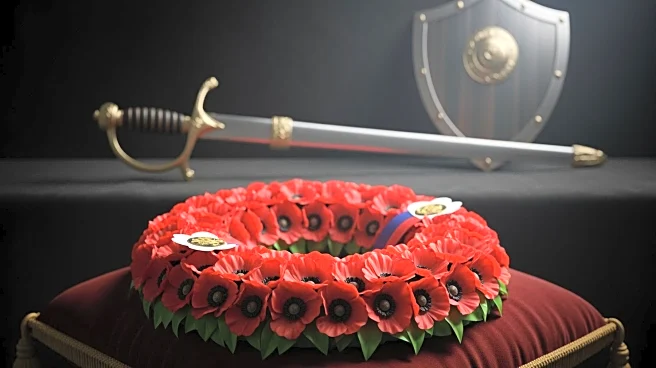What's Happening?
Prince George joined King Charles III, Queen Camilla, and Catherine, Princess of Wales, at the Festival of Remembrance held at London's Royal Albert Hall. The event, organized by the Royal British Legion,
commemorates those who lost their lives in military service. This year's festival marked the 80th anniversary of the end of World War Two and reflected on the discrimination faced by LGBT personnel, 25 years after the ban on gay people serving in the armed forces was lifted. The event featured performances by Sir Rod Stewart and Sam Ryder, and was attended by Prime Minister Sir Keir Starmer and his wife Victoria. The Chelsea Pensioners, retired British Army veterans, were honored during the ceremony.
Why It's Important?
The Festival of Remembrance serves as a poignant reminder of the sacrifices made by military personnel and highlights ongoing efforts to address past discrimination within the armed forces. The inclusion of LGBT veterans and the unveiling of a memorial to honor them underscores the progress made towards inclusivity in the military. The presence of senior royals and political leaders at the event emphasizes the importance of national unity and remembrance. It also reflects the Royal Family's commitment to supporting military communities and recognizing their contributions to national security.
What's Next?
King Charles III will lead the nation in a two-minute silence on Remembrance Sunday to honor those who died in service during the world wars and other conflicts. The National Service of Remembrance ceremony at the Cenotaph in central London will see participation from senior royals and political leaders, with wreaths being laid in tribute. The Royal British Legion's march-past will include 10,000 armed forces veterans, alongside World War Two veterans, continuing the tradition of honoring military service and sacrifice.
Beyond the Headlines
The event also highlights the cultural significance of remembrance ceremonies in fostering national identity and collective memory. The participation of veterans who planned D-Day and those who were prisoners of war provides a living connection to historical events, enriching public understanding of military history. The festival's focus on inclusivity and recognition of diverse military experiences may inspire further initiatives to support marginalized groups within the armed forces.









